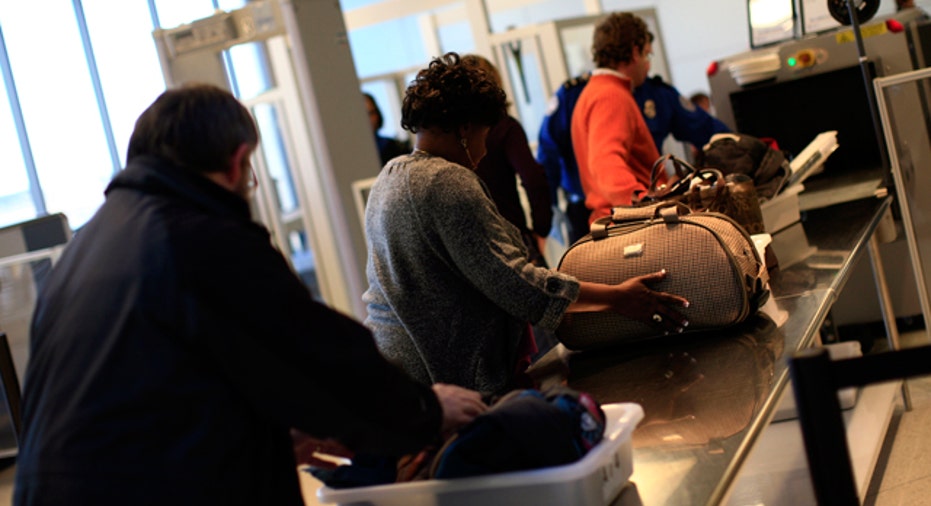Can My Pet Earn Frequent Flier Miles?

Looking to earn frequent flier miles for your globetrotting dog or cat?
You'll have to book Sassy and Max on either New York-based JetBlue or London-based Virgin Atlantic, the only two airlines that currently offer points for pets flying in North America. A third option for U.S.-based "pet-sengers," the Continental PetPass, was suspended during the airline's 2010 merger with United and is "currently under review," according to spokeswoman Jennifer Dohm.
JetBlue JetPaws
With JetBlue's JetPaws program, members of the airline's TrueBlue frequent flier club earn 300 points each time they board with their pet. There are conditions, of course. All pets must fly with their owner in the passenger cabin within a closed carrier that fits beneath the seat. The combined weight of the pet and carrier must not exceed 20 pounds. Limit one pet per passenger per flight. And yes, pets-to-go count as one personal carry-on.
"The JetBlue program is a cinch to use and track," says Mary-Alice Pomputius, author of "Bone Voyage: Travel With Your Pet" and the website DogJaunt.com. When you open your TrueBlue account page, your pet travel points are included in your total point value and also tracked separately so you can easily check for accounting errors."
Virgin Atlantic Flying Paws
At Virgin Atlantic's Flying Paws program, pet owners receive 1,000 club miles for shorter flights and 2,000 for longer ones, but the pet accommodations are far different. Because Virgin prohibits pets in the cabin, all dogs and cats must travel in cargo. That's not all bad news: The cargo hold is climate-controlled, just like first class, and dogs and cats of all sizes are welcome to fly solo.
"Sometimes there are occasions where the pet or the family might have to go ahead and the pets still get the air miles," says Karen Kerslake, Virgin Atlantic marketing and public relations manager for cargo. "If the owner is a Flying Paws member, their pets will get air miles, even if the owner flies earlier or later."
Virgin Atlantic pioneered pet miles more than a decade ago at the request of Virgin Group founder -- and pet fancier -- Sir Richard Branson.
"The original scheme was to reward the pet rather than the pet owner with little passports and stamps that could be redeemed for T-shirts or toys or a trip to the poochy parlor, a bit like we give children backpacks and coloring books," Kerslake recalls. "After a while, owners said they would prefer the actual flying club miles rather than the treats."
Over the years, Virgin's cargo hold has transported a furry Who's Who of celebrity pets, including Lassie and Uggie, the adorable Jack Russell terrier from the Oscar-winning silent film, "The Artist."
We love travel. We love pets. So ...
Why the surge of interest in points for pampered pals?
"Because the pet business is huge; it's growing by $2 billion a year, straight through the recession," says Susan H. Smith, owner and president of PetTravel, a Fort Lauderdale, Fla.-based worldwide pet travel resource. "It's a moneymaker for the airlines, most of which charge $125 and up to carry a pet. The loyalty points are meant to offset the pet fee."
Smith says pet air travel can quickly turn complex -- and even deadly -- once Mr. Whiskers leaves U.S. airspace.
PetTravel posts the pet transport policies for 160 countries and passport documents for 240 countries online, and there's little uniformity among them. Island nations such as Australia, Japan, Iceland, New Zealand, Great Britain and Caribbean destinations that consider themselves rabies-free can require vaccinations and documentation six months out before allowing an animal in.
"If the pet doesn't meet the requirement, it either has to go into quarantine at the owner's expense, be returned to its origination point at the airline's expense or be euthanized -- and it happens," Smith explains. "Pet owners should not trust anybody. They need to know the requirements themselves."
JetBlue flat-out won't fly pets to Jamaica, Barbados, St. Lucia, Trinidad, Tobago or the Cayman Islands. In addition, some airlines, including British Airways and Dublin-based Aer Lingus, will only accept pets booked in cargo through an agent, further complicating family travel planning.
Smith says the pet charter idea has been tried several times, most recently by the now-defunct Pet Airways.
"They provided pet-only, in-cabin travel on older planes that they would lease," she says. "It was a wonderful thing, but the flights were slow because they had to stop en route. It would take like 24 hours to fly a dog from Los Angeles to New York."
Private charter? Forget about it. "You're talking bucks," she says. "These jets are privately owned and very plush, so the owners are understandably concerned about pets."
Fortunately, the ongoing retirement of the baby boom generation is likely to make pet travel easier. Unfortunately, Pomputius says it's unlikely to make it cheaper.
"Will increased demand drop prices? I suspect not. Airlines will continue to offer only a limited number of spots per flight to in-cabin pets out of concern for allergy sufferers, even though that issue is fueled with emotions and anecdotes but entirely lacking in science," she says. "I suspect increased demand will make pet spots even more valuable and fees will remain steep."
See related: Good dog, bad bill: Compare vet care financing options



















